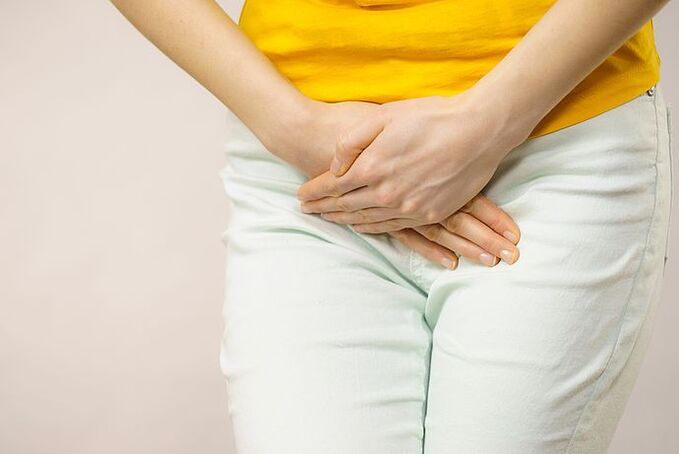
Cystitis is inflammation of the bladder wall in an acute or chronic process. It is manifested by frequent urination and painful urination, pus in the urine, blood clots, in children with symptoms of poisoning, fever. The disorder is common in people of any age and gender, but is more common in women, and is related to the anatomical features of the urinary system.
symptoms of cystitis
Cystitis is divided into acute and chronic. The acute form is characterized by spontaneous onset and rapid progression. The first sign is frequent urination every 20-30 minutes. The patient complained of pain in the suprapubic area, pain spreading to the perineum, genitals, increased abdominal pressure, and a slightly full bladder. The urination itself is painful, with a burning sensation and pain, and the act ends with the release of a few drops of blood. Changes in the color and clarity of the urine: it looks cloudy, dark, has sediment, and has an unpleasant odor. With good results, health improves in 4-5 days and patient recovers in 7-10 days.
Chronic cystitis is characterized by alternating worsening and remission or a sustained slow course. Symptoms correspond to the acute form, the severity of which increases during the acute phase.
reason
For the development of cystitis, certain conditions are necessary: infection, changes in the shape or function of the bladder. In most cases, the disease is contagious. The main pathogens of cystitis are Escherichia coli, Streptococcus epidermidis, Proteus, Klebsiella, Pseudomonas aeruginosa, and Enterococcus. Microorganisms enter the bladder lumen from the external environment (kidneys) and rarely from other foci of inflammation: via lymph, blood, damaged bladder wall.
A favorable background for the development of bladder inflammation is caused by:
- Frequent hypothermia;
- Infrequent or incomplete urination;
- decrease in immunity;
- a sedentary lifestyle;
- wearing clothes that are too tight;
- malnutrition;
- vitamin deficiency;
- Physical and psychological overwork;
- chronic disease;
- change sexual partners or begin sexual activity;
- Surgical intervention on bladder and prostate;
- does not meet hygiene standards;
- Effects of radiation, chemicals and toxic substances on the human body;
- Treatment with antibiotics and nephrotoxic drugs;
- Presence of foreign bodies: catheters, kidney stones, ureteral stents.
In the development of cystitis, a certain role belongs to diseases and pathological conditions such as diabetes, urolithiasis, Huerta stenosis in boys/men, prostate adenoma, prostatitis, dysbacteriosis, intestinal infection, helminthiasis.
Variety
Cystitis is classified according to different criteria:
- Downstream: acute - characterized by inflammatory lesions of the mucosa and submucosa, chronic - morphological changes affecting the muscle layer;
- By etiology: bacterial (divided into specific and non-specific) and non-bacterial (chemical, drug, radiation, allergy);
- Forms: primary - occurs in the absence of structural and functional changes in the urinary system, secondary - develops in the presence of bladder dysfunction, anatomical changes;
- According to the prevalence of the inflammatory process: focal (limited) and total (diffuse).
diagnosis
In the diagnosis of cystitis, the results of clinical presentation, laboratory and instrumental studies help urologists. The main role of the identification of cystitis, its type, characteristics of the course of the disease belong to the general analysis of urine, the culture of urine flora, the determination of the level of acidity in the urine. Depending on the indication, endoscopy (cystoscopy) or X-rays (cystography), urography, and bladder ultrasonography of the bladder mucosa are performed.
To confirm/rule out cystitis, specialists in CMRT clinics use modern diagnostic methods such as:
- MRI (Magnetic Resonance Imaging)
- Ultrasound (Ultrasonic)
- Duplex scanning
- Computer Topographic Map of Spine Diers
- Physical examination (full body examination)
- CT scan
which doctor to contact
Urologists diagnose and treat this condition. Consultation with a gynecologist and other specialists may be necessary depending on the cause and symptoms of concomitant diseases.
How to treat cystitis
The course of treatment is chosen by urologists, sometimes in collaboration with endocrinologists, gynecologists, infectious disease specialists, gastroenterologists, surgeons, and other specialists. In the stage of acute cystitis, in order to relieve symptoms of dysuria, a lacto-vegetarian diet is recommended, limiting spicy, salty, fatty foods, spices, hyperthermia in the bladder area. In order to quickly remove toxins, bacteria, and inflammatory components from the bladder, it is necessary to intensify the drinking regimen. In addition to slightly alkaline mineral water, you can also drink fruit juice, fruit juice drinks, candied fruit, and light green tea.
Among the drugs for the treatment of simple urinary tract, taking into account the type of pathogen, urinary tract disinfectants, antibacterials, antimicrobials, antivirals are used. To get rid of pain, relieve muscle spasms, stop the symptoms of inflammation as prescribed, take analgesics, NSAIDs, antispasmodics. In addition to primary treatment, herbal medicine, electrophoresis, and magnetic therapy are prescribed after signs of disease subside.
In the complication stage, if the disease cannot be cured by conservative treatment, surgical resection of the bladder or the diseased part is performed by excision, laser irradiation, freezing and other methods.
complication
Prerequisites for the development of complications produce chronic and secondary forms. Possible adverse effects include:
- Bladder neck sclerosis deformity;
- Anatomical and functional changes of the bladder;
- vesicoureteral reflux (the reverse flow of urine from the bladder into the ureter);
- peritonitis;
- pyelonephritis;
- Inflammation of the wall of the urethra.
prevent cystitis
Preventing cystitis can help:
- Exclude hypothermia;
- Prevent physical and psychological overwork;
- healthy and nutritious food;
- genital hygiene;
- Early detection and treatment of infections and concomitant diseases;
- The system empties the bladder;
- enhance immunity;
- Follow drinking rules.





























